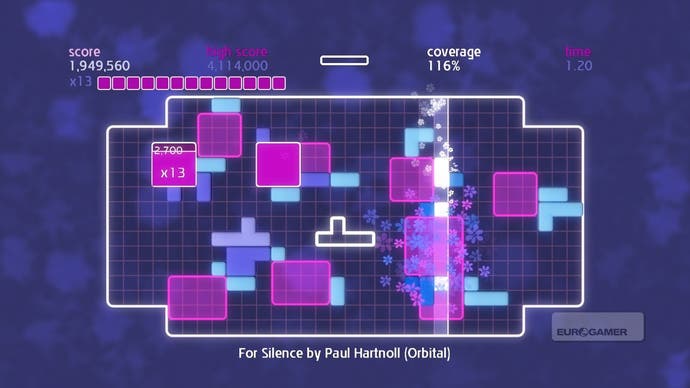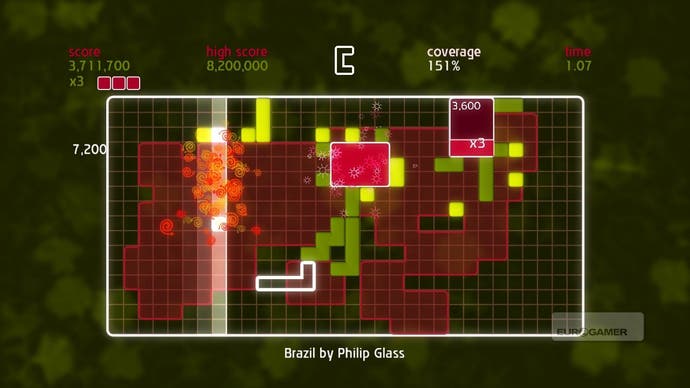Chime
Band Aid.
In the game you must place Tetris-esque shapes upon a Lumines-style play area. In an inversion of the block-clearing purpose of most puzzle games, here the aim is to fill the play area with blocks, triggering audio snippets as you do so and building up the song beneath.
"I love Lumines. I know it divides people, particularly with respect to the time it takes for a single game, but it's one of the few games in which I can get completely lost," says Curran.
"We're obviously going to be compared to it, just like all block games get compared to Tetris. Which is fine because there are similarities, of course, but the two primary influences for the things I brought to the project weren't videogames; they were a plastic pentominoes set I found in a cupboard and a musical step sequencer. The sequencers brought the timeline, which is something the game shares with Lumines, while the pentominoes inspired the gameplay."
With contributions from Moby, Orbital and, of course, Philip Glass - all of who donated their compositions in the spirit of charitable concern - Chime has a prestigious soundtrack. But as the trend in music gaming moves toward personal expression over mere Simon-Says replication, I ask Curran how flexible the mixes are in play.
"You place blocks on the playfield, and they're read by a bar that moves at a constant pace, from left to right and looping back to the start. When the bar strikes them they play a sound. Blocks play different notes depending on their position on the vertical axis - a higher placed block will play a higher pitched note," he explains.
"So you're slowly building this melody over a backing loop that we provide. If you cluster blocks together they can form bigger squares, ‘quads'. The quads play special sounds and disappear when the timeline strikes them, colouring in the background. The object is to colour in the whole playfield.

"When you reach certain percentage goals - say, 20 per cent of the playfield covered - the backing loop that you're playing over will change. To that extent it's on rails, but the noise you make over that loop is wholly player controlled. There's a freeform mode where you can just play around with this, of course, like you would in a step sequencer."
There's been a lot of talk in the past few months about the death of the music game, or at least its oversaturation of the market. I ask Curran if games like Chime offers an alternate future to games that combine systems and music?
"Music is just another aspect of videogames," he explains. "Talk of the death of the music game genre is disingenuous; what people mean is, ‘Some games that are to do with music have not sold as well as expected,' and I think we can all come up with lots of reasons why that might be.
"But it's not that people have stopped caring about music, or that we've run out of ways in which people can interact with music. Still, I wouldn't describe Chime as a music game; it's primarily an action-puzzle game, like Tetris, Bust-a-Move or Pipemania or whatever, but with strong musical synchronicity."

For developer Zoe Mode, Chime could potentially launch a series - any potential sequel would not have to be part of the OneBigGame initiative, allowing the studio to recoup costs on this first title.
I ask Curran to define his hopes for the project after release. "I can't see the future. But if I could I'd hope the whole world was playing some next-next-generation sequel to Chime, that it was on all platforms including your brain, that it had saved the world back in 2010 and that the national anthem of space was some Chime composition that gets reworked every day.
"For now, though, it's XBLA only. 400 Points! I've spent more than that on five sets of virtual horse armor."
Chime is released on XBLA on 3rd February. 60 per cent of the 400 MSP (£3.40/€4.80) asking price will be donated to children's charities around the world.

